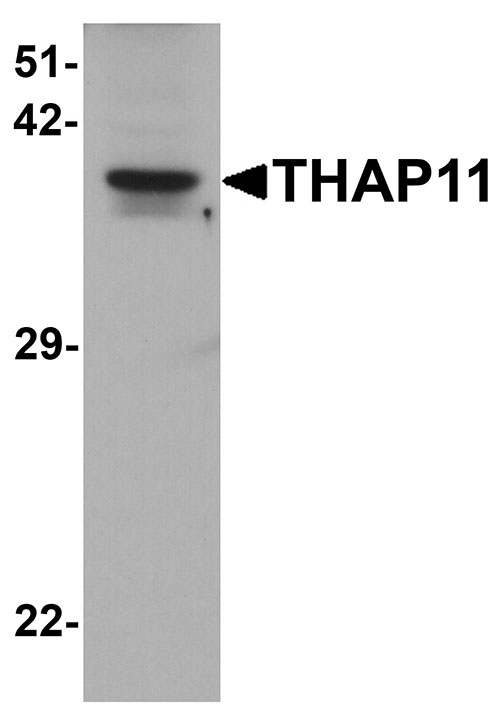THAP11 Antibody
- 产品详情
- 实验流程
- 背景知识
Application
| WB, E |
|---|---|
| Primary Accession | Q96EK4 |
| Other Accession | NP_065190, 40354197 |
| Reactivity | Human, Mouse, Rat |
| Host | Rabbit |
| Clonality | Polyclonal |
| Isotype | IgG |
| Calculated MW | 34455 Da |
| Concentration (mg/ml) | 1 mg/mL |
| Conjugate | Unconjugated |
| Application Notes | THAP11 antibody can be used for detection of THAP11 by Western blot at 1 - 2 µg/ml. |
| Gene ID | 57215 |
|---|---|
| Other Names | THAP domain-containing protein 11, THAP11 |
| Target/Specificity | THAP11; THAP11 antibody is human, mouse and rat reactive. |
| Reconstitution & Storage | THAP11 antibody can be stored at 4℃ for three months and -20℃, stable for up to one year. |
| Precautions | THAP11 Antibody is for research use only and not for use in diagnostic or therapeutic procedures. |
| Name | THAP11 |
|---|---|
| Function | Transcription factor, which has both transcriptional activation and repression activities (PubMed:31905202). Also modulates chromatin accessibility (PubMed:38361031). In complex with HCFC1 and ZNF143, regulates the expression of several genes, including AP2S1, ESCO2, OPHN1, RBL1, UBXN8 and ZNF32 (PubMed:26416877). May regulate the expression of genes that encode both cytoplasmic and mitochondrial ribosomal proteins (By similarity). Required for normal mitochondrial development and function. Regulates mitochondrial gene expression, including that of components of the electron transport chain (By similarity). Involved in the maintainance of pluripotency in early embryonic cells, possibly through its action on mitochondrial maturation which is required to meet high energy demands of these cells (By similarity). Required for early development of retina, preventing premature exit of retinal progenitor cells from the cell cycle. This effect may also be mediated by its action on mitochondria (By similarity). Through the regulation of MMACHC gene expression, controls cobalamin metabolism (PubMed:28449119, PubMed:31905202). Required for normal brain development and neural precursor differentiation (By similarity). Involved in cell growth (PubMed:31905202). |
| Cellular Location | Nucleus. Cytoplasm Note=In oocytes, detected in the ooplasm, without evidence of its presence in the nucleus (By similarity). Found in the nucleus of undifferentiated embryonic stem cells (PubMed:18585351). Evenly distributed between nucleus and cytoplasm in skin fibroblasts (PubMed:37148549). {ECO:0000250|UniProtKB:Q9JJD0, ECO:0000269|PubMed:18585351, ECO:0000269|PubMed:37148549} |
| Tissue Location | Expressed in skin fibroblasts. |
For Research Use Only. Not For Use In Diagnostic Procedures.
Provided below are standard protocols that you may find useful for product applications.
BACKGROUND
The THAP domain-contining protein 11 (THAP11), also known as Ronin, is an essential factor involved in embryonic stem (ES) cell pluripotency and cell growth (1). THAP 11 contains a THAP domain, a conserved DNA-binding domain common to many proteins associated with chromatin modification and gene expression silencing, and has striking similarity to the site-specific DNA-binding domain (DBD) of Drosophila P element transposases (2). THAP11 can also negatively regulate CD44 v6 expression through its interaction with the poly(rC) binding protein PCBP1 (3).
REFERENCES
Dejosez M, Krumenacker JS, Zitur LJ, et al. Ronin is essential for embryogenesis and the pluripotency of mouse ES cells. Cell 2008; 133:1162-74.
Roussigne M, Kossida S, Lavigne AC, et al. The THAP domain: a novel protein motif with similarity to the DNA-binding domain of P element transposase. Trends Biochem. Sci. 2003; 28:66-9.
Lian WX, Yin RH, Kong XZ, et al. THAP11, a novel binding protein of PCBP1, negatively regulates CD44 alternative splicing and cell invasion in a human hepatoma cell line. FEBS Lett. 2012; 586:1431-8.
终于等到您。ABCEPTA(百远生物)抗体产品。
点击下方“我要评价 ”按钮提交您的反馈信息,您的反馈和评价是我们最宝贵的财富之一,
我们将在1-3个工作日内处理您的反馈信息。
如有疑问,联系:0512-88856768 tech-china@abcepta.com.























 癌症的基本特征包括细胞增殖、血管生成、迁移、凋亡逃避机制和细胞永生等。找到癌症发生过程中这些通路的关键标记物和对应的抗体用于检测至关重要。
癌症的基本特征包括细胞增殖、血管生成、迁移、凋亡逃避机制和细胞永生等。找到癌症发生过程中这些通路的关键标记物和对应的抗体用于检测至关重要。 为您推荐一个泛素化位点预测神器——泛素化分析工具,可以为您的蛋白的泛素化位点作出预测和评分。
为您推荐一个泛素化位点预测神器——泛素化分析工具,可以为您的蛋白的泛素化位点作出预测和评分。 细胞自噬受体图形绘图工具为你的蛋白的细胞受体结合位点作出预测和评分,识别结合到自噬通路中的蛋白是非常重要的,便于让我们理解自噬在正常生理、病理过程中的作用,如发育、细胞分化、神经退化性疾病、压力条件下、感染和癌症。
细胞自噬受体图形绘图工具为你的蛋白的细胞受体结合位点作出预测和评分,识别结合到自噬通路中的蛋白是非常重要的,便于让我们理解自噬在正常生理、病理过程中的作用,如发育、细胞分化、神经退化性疾病、压力条件下、感染和癌症。






